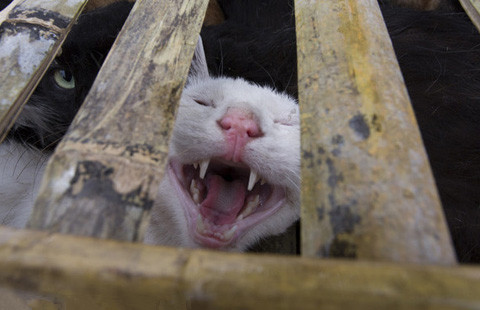Emperor penguins waddling to extinction, study finds
Updated: 2014-07-01 07:41
By Agencies in Oslo and Paris (China Daily)
|
||||||||
Global warming will cut Antarctica's 600,000-strong emperor penguin population by at least a fifth by 2100 as the sea ice on which the birds breed becomes less secure, a study found on Sunday.
The report urged governments to list the emblematic birds as endangered, and to better protect their habitat. Such a listing could impose restrictions on tourism and fishing companies.
The new study sheds light on the birds' reliance on sea ice for breeding and raising their young. The ice also protects their prey - fish and krill - by maintaining the food chain.
Declining sea ice caused by climate change would place all 45 known emperor penguin colonies into decline by 2100, according to the population simulation.
"At least two-thirds (of colonies) are projected to have declined by (more than) 50 percent from their current size" by the end of the century, said the paper published in the journal Nature Climate Change.
Dynamics differ between colonies, but "the global population is projected to have declined by at least 19 percent", after growing by 10 percent up to 2048, it added.
The team said colonies between the eastern Wedell Sea and the western Indian Ocean will see the biggest declines, while those in the Ross Sea will be least affected.
The Ross Sea penguin population will continue to grow until 2100, after which the trend will reverse.
"Our results indicated that at least 75 percent of the emperor penguin colonies are at least vulnerable to future sea ice change and 20 percent will probably be quasi-extinct by 2100," the paper said.
Given these findings, the emperor penguin "is fully deserving of endangered status due to climate change", the team said, referring to the International Union for Conservation of Nature's Red List of Threatened Species.
The bird is listed as "stable" by the list.
Environmentalists urged governments to agree to proposed marine reserves in the Ross Sea and off east Antarctica - so far opposed by Russia - to safeguard wildlife.
"Marine reserves are one of the best ways to protect penguins," said Andrea Kavanagh of the Pew Charitable Trusts.
Reuters - AFP
|
An emperor penguin walks in New Zealand, some 3,000 km from its Antarctic home. Global warming will send Antarctica's emperor penguins into decline by 2100, scientists predict in a paper published on Sunday. Richard Gill / Agence France-Presse / Ho / Department of Conservation |
(China Daily 07/01/2014 page11)

 Culture camp delivers authentic China
Culture camp delivers authentic China
 RIMPAC press conference holds in Hawaii
RIMPAC press conference holds in Hawaii
 Mulan returns to New York City
Mulan returns to New York City
 US admiral tours Chinese warship
US admiral tours Chinese warship
 Bank of China opens branch in Queens
Bank of China opens branch in Queens
 Minister: Culture the strongest bond linking China, US
Minister: Culture the strongest bond linking China, US
 Asian Film Festival gets underway with Overheard 3
Asian Film Festival gets underway with Overheard 3
 Chilean wines find a market in China
Chilean wines find a market in China
Most Viewed
Editor's Picks

|

|

|

|

|

|
Today's Top News
Bank of China New York opens Queens branch
Former military leader expelled from CPC
China to increase personnel for peace
China, US pact to curb offshore tax evasion
Transformers 4 breaks records in China
DPRK to put two Americans on trial for hostile acts
China, US agree to curb tax evasion
Suspect pleads not guilty in Benghazi attack
US Weekly

|

|






